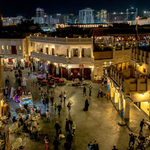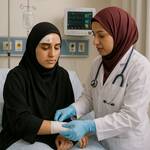Qatar’s healthcare system offers a mix of public and private medical services, with high standards and a wide range of facilities. Hamad Medical Corporation (HMC) is the main provider of public healthcare, operating numerous hospitals and healthcare centers. Private hospitals like Al Emadi Hospital, The View Hospital, and others also provide specialized and general medical services.
Public Healthcare System (Hamad Medical Corporation – HMC)
HMC is the main provider of public healthcare services in Qatar. It operates multiple hospitals and specialized centers.
Key Public Hospitals:
- Hamad General Hospital
- General care and emergency services.
- foundation of Qatar’s hospital system.
- network and delivers more than one million episodes of care to patient every year across outpatient, inpatient and emergency services.
- more than 5,000 dedicated clinical and support staff work in Hamad General Hospital and the many facilities across Doha run by the hospital. These include the Pediatric Emergency Centers, Bone and Joint Center and Fahad Bin Jassim Kidney Center.
- In 2019, HGH opened its state-of-the-art Trauma and Emergency Center, providing an expansive modern facility in which to treat patients with life-threatening conditions. The Trauma and Emergency Center is home to Qatar’s only Level 1 Trauma Center which has been recognized locally and internationally, including by the World Health Organization and by Accreditation Canada International, for its success in advancing the care of severely injured patients.
- Al Wakra Hospital
- Full-service hospital for southern Qatar.
- The hospital has capacity for 325 beds; 248 of which are for general and acute patients and 77 are reserved for critical care, high dependency and burns patients. There are also an additional 77 observation/day beds. Around 30 percent of beds are in single occupancy rooms, all of which have an en suite bathroom.
- The new hospital’s laboratories are equipped to the highest international standards with some of the world’s newest automated testing equipment that enables fast and efficient analysis of a high volume of samples.
- Women’s Wellness and Research Center
- a pioneering facility dedicated to addressing the unique health needs of women. This center stands out for its comprehensive approach, combining clinical care with research initiatives aimed at improving women’s health outcomes.
- The WWRC offers a range of services, including gynecological care, maternal health, and specialized programs for chronic conditions that disproportionately affect women. The focus is on providing personalized care that empowers women to take charge of their health.
- Heart Hospital
- specialist tertiary hospital committed to delivering high quality care in cardiology and cardiothoracic surgery for the adult population of Qatar.
- Upgrade plans include a doubling of capacity in the Emergency Department and the provision of a dedicated cardiac magnetic resonance imaging facility.
- Rumailah Hospital
- a multi-specialty hospital that provides medical, surgical and long-term care to the population of Qatar. It is part of Hamad Medical Corporation (HMC) and provides a warm, welcoming and healing environment, focused on safe, high-quality patient centered care.
- services are provided from the original main hospital site, such as dermatology, ophthalmology, plastic surgery and care for the elderly.
- Cuban Hospital
- Located in Dukhan, in partnership with Cuba and the State of Qatar.
- offers patients dedicated, specialized care and a unique range of services including comprehensive dentistry, dermatology, diabetes, gynecology, ENT and audiology, emergency services for children and adults and general medicine.
- Qatar Rehabilitation Institute
- launched in 2016 is the region’s largest tertiary rehabilitation hospital, providing world class integrated rehabilitation services. At the heart of this care is passionate multi-disciplinary team of clinicians.
- The care provided is based on the most up-to-date rehabilitation research and practice in an environment that encourages healing– both mentally and physically. QRI offers five main rehabilitations programs – Stroke, Traumatic Brain Injury, Spinal Cord Injury, Pain Management and Pediatric Rehabilitation.
- These programs are made up of clinical and Physiotherapy services which are selected and adapted according to each patient’s needs by the multidisciplinary team. Patients receive a customized care. Patients suffering from stroke, hemiplegia, quadriplegia, paraplegia, brain and spinal cord injuries and diseases, polyneuropathies and pain.
- The facility also caters to elderly patients suffering from impaired joint mobility, muscle performance, Joint arthroplasty, amputation, rheumatoid Arthritis, Osteoarthritis and other neuromuscular ailments.
- We also care for pediatric patients in settings including day care rehabilitation, long term care through Al Maha units I, II and III for chronically ill and Intensive rehabilitation for patients required complex care.
- Al Khor Hospital
- located in the northern part of Qatar, serves the community in Al Khor.
- the hospital hosts an Antenatal and Postnatal exercise center – an important step in Al Khor’s hospital’s endeavor to attain recognition by the World Health Organization as a baby-friendly hospital.
- National Center for Cancer (NCCCR)
- provides a full spectrum of cancer care, including Bone Marrow Transplants, cutting-edge Radiation Oncology using technologies like TrueBeam, ETHOS, and CyberKnife, and comprehensive genetic counseling to assess hereditary cancer risks
- The center also prioritizes mental health, offering psychotherapy services to support patients throughout their treatment journey.
- NCCCR also provides comprehensive genetic counselling and testing to identify hereditary cancer risks, empowering patients to make informed decisions about their care and the importance of mental health during treatment is acknowledged with psychotherapy services that equip patients with coping strategies to address physical and psychological needs.
- Sidra Medicine
- Sidra Medicine represents the vision of Her Highness Sheikha Moza Bint Nasser who serves as its chairperson. This high-tech facility is home to world-class patient care, scientific expertise and educational resources.
- it will initially address the growing need for more comprehensive patient-focused medical services for women and children in Qatar and throughout the region.
Major Private Hospitals:
- Al Ahli Hospital
- Ahli Hospital is proud to host Qatar’s premier specialized medical centers:
- Heart Center – Cutting-edge cardiac care with leading interventional cardiologists
- IVF and Fertility Center – Helping families achieve their dreams with advanced reproductive technologies
- Dental Center – Comprehensive dental solutions from routine care to complex procedures
- General and Bariatric Surgery – Pioneering surgical interventions with minimally invasive approaches
- Neurology and Neurosurgery – Expert care for complex neurological conditions
- Al Emadi Hospital
- outpatient clinics cover General Surgery, Plastic Surgery, Pediatrics, ENT, Ophthalmology, Orthopedics, Internal Medicine, Cardiology, Neurology, Dermatology, Dentistry, Pulmonology, Obstetrics & Gynecology, Urology, Rheumatology and Diets & Nutrition, Laboratory, Emergency, and Pharmacy.
- Al-Emadi Hospital is the first private hospital in the State of Qatar that has received the platinum level of Canadian international accreditation, which is the highest degree awarded globally for excellence in high-quality medical and administrative standards and practice
- Aster Hospital
- the largest private healthcare provider in the region offering a full range of medical services from General Medicine, Pediatrics, Gynecology, ENT, Dentistry, and others to specialty services like Cardiology, Neurology, Gastroenterology, General & Laproscopic Surgery, Urology, etc.
- now operates six medical centers, six pharmacies, one full-fledged diagnostic center, and a multispecialty hospital. Aster Medical Centres and pharmacies are located in residential and business districts including C – Ring Road, Old Al Ghanim, Al Hilal, Al Rayyan, Al Khor, and industrial area.
- Doha Clinic Hospital
- Centrally located in New Al Mirqab Street, Doha Clinic Hospital is the first fully integrated private hospital to open in Qatar and offers first-class medical care.
- First integrated private hospital; family-based care across pediatrics, OBGYN, surgery.
- Turkish Hospital
- Multispecialty private hospital staffed by Turkish professionals
- covers ENT, orthopedics, psychiatry, cardiology, hair transplant.
- The View Hospital
- Located in the prestigious Al Qutaifiya area near Lusail, Katara, and The Pearl, this hospital represents a significant milestone in Qatar’s healthcare landscape.
- partnership with Cedars-Sinai, one of the leading medical centers in the United States with advanced robotic surgery suites, ICU, private rooms.
- Aspetar Hospital
- world-leading specialized orthopedic and sports medicine hospital and the first of its kind in the Middle East. Since 2007, with a global team of experts, the hospital has provided top-level comprehensive medical treatment to all athletes in a state-of-the-art facility that sets new standards internationally.
- Through the delivery of excellence in sports medicine, physiotherapy, sports science, orthopaedic surgery, and rehabilitation, Aspetar services the needs of football and Sports Clubs and Federations throughout the state of Qatar and regularly provides services to international athletes and the public.
- In 2009, Aspetar was accredited as a ‘FIFA Medical Centre of Excellence’ by F-MARC. Aspetar was certified as ‘The International Olympic Committee (IOC) Research Centre for Prevention of Injury and Protection of Athlete Health’ in 2014. In 2015, Aspetar was recognized as the ‘International Handball Federation (IHF) Reference Centre for Athlete and Referee Health’ and achieved the Accreditation Canada International (ACI) ‘Diamond Level’ accreditation award in 2018. The Asian Football Confederation (AFC) accredited Aspetar as an AFC Medical Centre of Excellence in 2020, and in 2021 Aspetar became the first healthcare organization globally to achieve 100% compliance to all applicable standards within Accreditation Canada’s Qmentum International accreditation program.
Health Insurance in Qatar
- Mandatory for Visitors and Residents: As of recent laws, private health insurance is mandatory for visitors. Residents are encouraged to have insurance for private care.
- Seha: National health insurance scheme (recently relaunched for locals).
- Private Insurance: Common providers include Cigna, Daman, AXA, and Bupa.
Notes on Access:
- Health Card (QR 100/year) recommended for residents to access public hospitals.
- Insurance required for most private hospitals.
- Visitors must have private health insurance under the law.
- Appointments can be booked online via:
- Nar’aakom App (for PHCC)
- Meddy.com (for private hospitals)
Apply for Health Card:
Community Clinics & Specialized Services
- Primary Health Care Corporation (PHCC): Over 28 neighborhood centers offering family medicine, pediatrics, women’s health, mental health, dental, vaccinations. Entry point for referrals to HMC or private care.
- Qatar Red Crescent Clinics (e.g. Al Hemaila Medical Centre): Focused on worker/community populations; handle general clinics, lab, radiology; serve up to 24,000 patients/month in Industrial Area and beyond.
How accessible medical treatment in Qatar is even for residents and non-locals:
Qatar has made healthcare accessible to all residents, regardless of nationality. Whether you are a citizen or an expat, you can receive affordable, high-quality care at any medical center in Qatar. The country’s healthcare system ensures that even the most vulnerable populations have access to necessary treatments.
Qatar’s growing expat population has led to an increased demand for healthcare services, and the country has responded accordingly. Many medical centers in Doha offer services tailored to the needs of the expatriate community.
From multilingual staff to specialized insurance plans, expats can access high-quality care without any barriers. This inclusivity has made Qatar a preferred destination for many foreign professionals and their families.
Public vs. Private Healthcare
Hamad Medical Corporation serves most of the national population. It operates seven tertiary hospitals, including Hamad General Hospital and the Women’s Wellness and Research Center, both JCI-accredited. With a Health Card—currently costing QAR 100 and renewable annually—patients receive reduced rates for consultations, lab work, and medications.
Meanwhile, the private sector has expanded quickly over the last decade. Facilities like Sidra Medicine, Doha Clinic, and Al-Ahli Hospital offer amenities such as private rooms, shorter wait times, and flexible appointments. These are often covered by corporate insurance packages, but it’s wise to confirm whether your insurer supports direct billing to avoid upfront costs.
Cost Comparison with Other Countries
A routine GP visit at a public clinic costs around QAR 30 with a Health Card, while private consultations range from QAR 300 to 400. MRI scans are typically priced between QAR 2,000 and 3,500, comparable to rates in European cities but lower than those in New York or Sydney. Some insurers have agreements with providers that eliminate out-of-pocket payments. If not, reimbursement is usually processed within 14 days, provided receipts are complete.
Comparison with Other Healthcare Models
In terms of structure, Qatar’s system is similar to Singapore’s: a strong public backbone with affordable services, complemented by a thriving private sector. One notable difference is Qatar’s commitment to covering emergency treatment costs even for those without a Health Card, which is not common in many parts of Europe. In contrast, the United States relies heavily on private insurers, with typically higher out-of-pocket expenses. For many expats, Qatar offers a well-balanced mix of low taxes, high income, and accessible care.
According to the World Health Organization, Qatar is spending more money per capita on healthcare than any other country in the Middle East and is free, or heavily subsidized, to nationals, expats and visitors alike. This has resulted in comprehensive primary healthcare and specialist, as well as general hospitals in both the public and private sector. All healthcare in Qatar is monitored and evaluated by the Supreme Council of Health (SCH), and all private hospitals must be accredited by an internationally recognized body. The SCH website lists all licensed practitioners and pharmacies.
Most expats’ first encounter with the SCH will be with the Medical Commission (MC) which is responsible for medical certificates required by all prospective employees and their families, and university students on arriving in Qatar. The MC based in the Industrial Area, near Abu Hamour handles up to 1,500 new arrivals per day.
The MC is divided into four units for different categories of expats; those taking up jobs in more senior positions, families, domestic workers and laborers.
Public healthcare in Qatar free to Qatari nationals and subsidized for expats, but it is essential to have a government issued health card to ensure only nominal fees for treatment.
Emergency Medical Services
- Call 999 for ambulance or emergency care.
Emergency services are free for everyone in Qatar, including non-residents.






